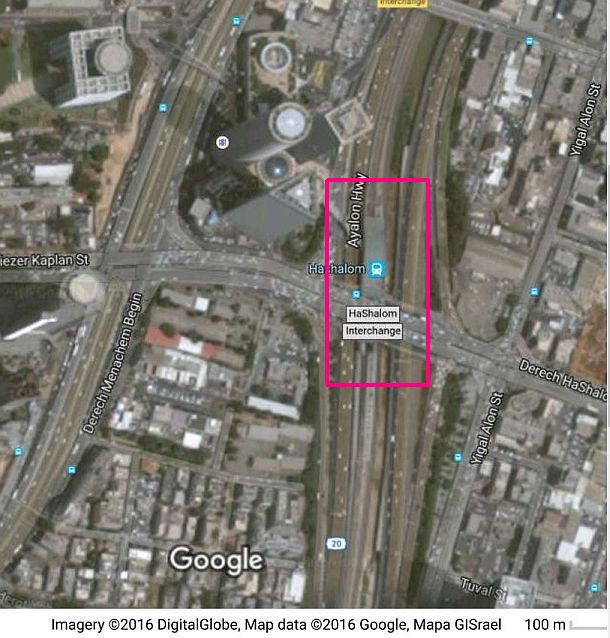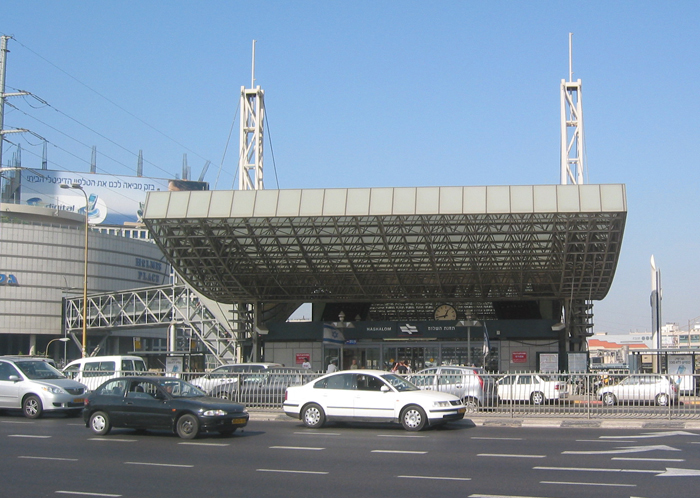The location of the recent controversial chilul Shabbos

Both Jerusalem and Tel Aviv have successful rail public transit systems, and both are expanding. The Tel Aviv system is expanding through some of the most congested parts of the city.
Several weeks ago, chareidi politicians learned that quite a bit of work was scheduled for Shabbos. They went into action and relatively easily arranged that much of the work would not take place on Shabbos. However there remained a considerable amount of construction that police authorities said that doing them during the week involved "pikuach nefesh" and thus should best be done on Shabbos when there would be no "pikuach nefesh."
However the police definition of pikuach nefesh is far from the halachic definition of this concept. Police opined that work in areas that are heavily traveled during the week, such as the area around the Derech Hashalom train station, involve threats to "pikuach nefesh". However, although such work would be a tremendous inconvenience for thousands of travelers, there is no way that they are considered pikuach nefesh in a halachic sense, nor in a common-sense understanding of the term.
Last Thursday and Friday erev Shabbos Eikev there were intense discussions among the chareidi politicians, the prime minister, and the transportation minister. The unfortunate result of all of it was there was a large-scale and very public chilul Shabbos in construction in and around the Derech Shalom train station that is next to the Ayalon Freeway and the Derech Shalom street, both of which are full of traffic during the week. Moreover, the rail transit authority took publicity pictures over Shabbos, and the transportation minister held a press conference at the site right after Shabbos, to apparently emphasize the chilul Shabbos.
All observers agreed that this was the largest officially sanctioned chilul Shabbos to ever take place in Israel. Chareidi politicians wasted no time in threatening a coalition crisis over the matter, and it is well known that chilul Shabbos crises often take on a momentum of their own and can have considerable consequences. Several Israeli governments have fallen over such issues.
The prime minister's office proposed a committee that would have final say on chilul Shabbos.
MK Rabbis Moshe Gafni, Yaakov Litzman, and Arye Deri met this Tuesday with Prime Minister to discuss details for establishing a special committee with chareidi and government representation from the Prime Minister's office to deal with every situation arising involving possible Shabbos desecration which is claimed to fall under the category of essential pikuach nefesh, as it were.
"It is unheard of that work involving Shabbos desecration take place under government auspices when no life-saving issue is involved whatsoever," the chareidi parties insisted, stressing that they will not stand for the expanded flexible definition of pikuach nefesh, life preserving necessity, for negligible reasons.

A view of the Shalom Station that is being expanded
"We shall inform the Prime Minister that it is impossible to continue this norm of work being performed on Shabbos, and we shall protest vehemently to the Transportation Minister who is behind the latest unprecedented violation."
In response to the outspoken protest voiced throughout the Jewish world against a devastating performance of the mass Shabbos violation which took place in Tel Aviv, the Transportation Minister was forced to reprimand the director-general of the Israel Railway, Boaz Tzafrir, for the photography of the work taking place on Shabbos from a helicopter.
In its editorial on Tuesday, Yated Ne'eman commented:
"This could not have taken place in the past under a Likud government, notwithstanding that the party heads were not any more religious then than now. This disgraceful event was made possible because the Likud's so-called religious base has been undermined. This Likud is not the party which chareidi Jewry recognized and followed in partnership and loyalty in the flaming political desert. In the past, its members and heads were traditional people and the voting public consisted of traditional folk — the very public which is protesting now against unnecessary mass Shabbos desecration, and against the severe and ongoing blow to the Jewish character of the State of Israel.
"But this is not the problem, it is only a symptom. The party of the traditional masses has distanced itself from the traditionalism which is so vital to the chareidi public. Chareidi Jewry has done a lot of good for this public to assure that it would not stray or be inundated in the sea of apostasy and the stormy waves of these times. Many were the times that HaRav Shach expressed the fact that we are not [primarily] concerned with ourselves but rather with `Rechov Allenby' and for "the Jewish children who can't even recite the Shema," the average Israeli who must not be lost or severed. This concept was also an underpinning of the famous address which HaRav Shach delivered in the Yad Eliyahu stadium in Nisan of 5750 which rocked the entire country for the proverbial 500 parsecs by 500 parsecs."




